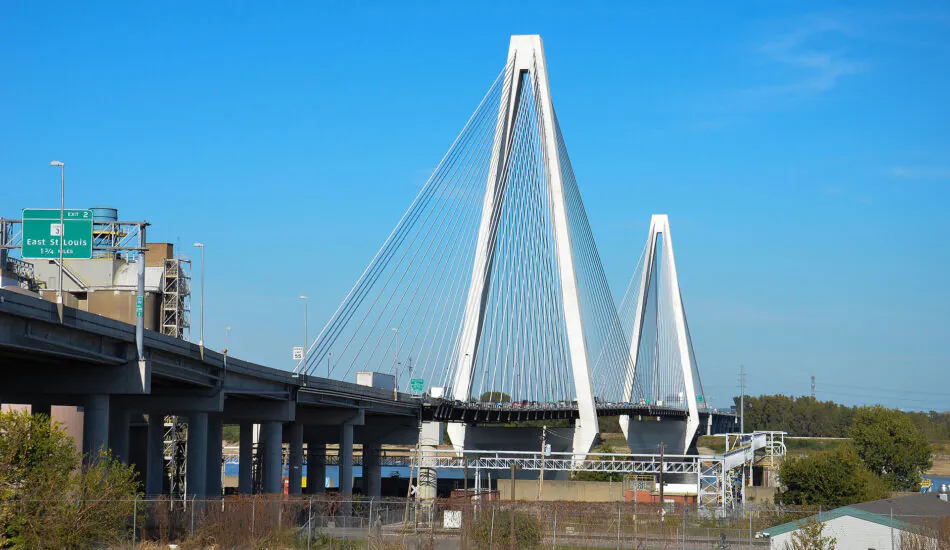East West Gateway (STL Regional) Report: Data and Recommendations

By The Cagle Law Firm | July 19, 2024 | Car Accidents, Featured, Inattentiveness
East-West Gateway Report on Road Safety
The East-West Gateway Council of Governments recent report focuses on providing safer transportation systems for all users across a multiple-county region of Missouri and Illinois–greater metro area. The report was prepared as a proposal for federal road improvement grant monies up to $8 million dollars. East West Gateway evaluates road safety initiatives, data and infrastructure developments from a bi-state perspective thus marrying Missouri and Illinois. The report “Gateway to Safer Roadways: St. Louis Regional Safety Action Plan” was published and is a cooperative analysis by transportation specialists to significantly reduce the number of people killed and seriously injured on roadways. Roadway fatalities account for 3% of all deaths in the United States and is the leading cause of death for those 8-20 years of age. Fatalities and serious injuries from roadway crashes are preventable thus unacceptable.
Data Summary
The data involved in this analysis is massive examining everything from types of roadways, vulnerable users-bicyclists and pedestrians, and leading causes of crashes.
Data between 2018 and 2022 was gathered for all crashes in the EWG Region including the above mentioned counties in Missouri and Illinois. A total of 349,528 crashes occurred in the EWG Region. Chicago. On average, over 69,000 crashes occurred each year which is the equivalent of about 200 crashes per day across the eight counties. St Louis County reported the highest number of crashes with about 41% of the total crashes and St Louis City with about 21 percent.
Fatal Crashes & Serious Injuries
The average number of fatal crashes in the EWG Region was 302 per year between 2018-2020. Unfortunately, the number has increased every year since 2020. St Clair County had the largest increase in fatal crashes in 2020. The regions’ average fatality rate increased by about 14% from before 2019 to after 2020. Considering most crashes are preventable, this is an astounding number of deaths.
The regions five year average for serious injuries crashes was over 1,600 per year. The higher than average trend continued into 2022 and the data suggests a sustained increase in serious injuries since Covid 19.
Time of Day Prime for Crashes
There are visible trends for the day of the week and time for increase in fatal and serious injury crashes. There is an increase in crashes in the late afternoon to early evening periods of time for all days of the week with 3 p.m-6 p.m. as peak time which also correlates with afternoon rush hour. However, the morning rush hour is associated with low crash occurrences. The most significant crash pattern emerging with increased likelihood of crashes in the latter half of the day on weekends. Fatal and serious injury crashes are highly concentrated on Friday, Saturday and Sunday evenings.
Top Four Contributing Factors
- Speeding – 30 percent of all fatal and serious injury crashes involved excessive speed.
- Failing to Yield the Right-of-Way– Failure to yield crashes account for 19 percent of all fatal and serious injuries
- Improper Lane Usage- improper lane changes account for 16% of fatal and serious injuries
- Alcohol/ Drug Use-Impaired Driving- Impairment contributed to 11% of fatal and serious injuries
- Distraction (Distracted Driving)- distracted driving contributed to 9 percent of fatal and serious injuries
Importance of Seat Belt Usage
Wearing a seat belt remains one of the most effective ways to prevent roadway fatalities and serious injuries. Nationally, 50% of passenger vehicle occupants killed in crashes are not wearing their seatbelt. Approximately 92% of Americans wear their seat belt, however, Missouri has a loser seat belt usage rate of 88 %. Nearly two-thirds of roadway fatalities in Missouri are unbuckled. Failure to wear seat belts is a bigger problem on the Missouri side of the EWG Regional area.
Currently, there have been 433 roadway fatalities in Missouri and 66% of those were not restrained.
While we have made tremendous progress in increasing seat belt use, far too many people are still dying because they were unbuckled in a crash. Do seat belts promise to keep you from injury? Of course not. They do increase your chances of survival. Statistics have shown that seat belts reduce the risk of front seat passenger car occupant deaths by 45 percent. The number is even higher for front seat passengers in light trucks–increasing survival rates by 60 percent.
Drop in Seat Belt Use in 2020
It appears that the beginning of Covid negatively impacted seat belt use. The unrestrained passenger vehicle occupants deaths increased from 46.6 percent to 50.9 percent. While there were many empty streets and fewer vehicles, we assumed there would be fewer crashes. Generally, when over half of the population is not commuting and schools are closed, crashes decrease. However, traffic fatalities actually increased during the pandemic. The NHTSA reported that traffic fatalities during the first half of 2021 increased 18.4 percent since the first half of 2020. The estimated fatalities during the first half of 2021 was the highest since 2006. Experts believe that many drivers may have engaged in riskier behaviors such as speeding, failure to wear seat belts and driving under the influence. A solid theme was the failure to wear a seat belt. That reluctance to buckle up during such a strange time in society may eventually be explained, however, roadway fatal and serious injuries increased while seat belt usage decreased.
We Can Choose Safer Driving Habits
While the East-West Gateway presented the report in effort to allocate resources for overall future roadway safety, we can take action as individuals to decrease our risks for motor vehicle collisions. Improving our roadways and our individual safety is a concept that most of us can get behind and does not really have a downside. We all want safer roadways for ourselves, our friends and families.
There are actions we can take every time we climb behind the wheel:
Follow the Rules of the Road– Simply, obey the traffic signals and laws. Actually “stop” when you come to a stop sign rather than a rolling stop and follow the rules for yielding and merging
Be Patient– Everyone is on the roadway to get to another destination. Being impatient and trying to save a few minutes off your drive could put you in a dangerous position
Drive Sober– While some things seem obvious, we still have too many people driving impaired.
Buckle Up– Please make it a habit and click your seat belt every time you get into a vehicle.
If You Are in a Crash, Know What to Do
If you are in a crash, know the first few things that you really must do to protect yourself and others.
Call 911– call immediately. Do not discuss or debate with another driver, call.
Take Photos of the Crash Site-If you can do so safely. When crashes occur in super busy areas, you may need to pull to the side of the roadway in safe spot
Take Down Witness Names- Take down all information that you can at the crash site.
Pain-Seek Immediate Medical Help. After a crash, we generally check ourselves for bleeding and protruding bones. If you have pain, you need to seek immediate medical help. Often adrenaline kicks in and masks some pain symptoms in the first couple of hours. If you develop pain, seek immediate help. Do not make the mistake of waiting to get help simply because it is car accident. Do not wait for an insurance adjuster to say it is “okay” for you to go tot he doctor. Actually, do not discuss the details of your treatment with an auto insurance adjuster.
Call An Attorney– Before you start giving statements to insurance carriers or calculating what you think your case is worth, call an attorney that specializes in motor vehicle accident injuries. Our attorneys can assist you in avoiding common mistakes good, smart folks make every day.
At The Cagle Law Firm, we know those injured in car accidents have many questions in the hours, days, weeks and months after a crash. Those who are injured require months if not years of medical treatment and it is an ordeal to recover. If you are hurt, you do not have the luxury of wasting time with an insurance adjuster who usually does not have your best interest as their goal.
Call us toll free 1-800-685-3302 or locally 314-276-1681
Contact Us Today
The Cagle Law Firm serves accident and injury clients throughout St. Louis and the greater St. Louis metro area, including St. Louis Counties of Chesterfield, Wildwood, Eureka, Ladue, Olivette, Clayton, Kirkwood, Fenton, Affton, and Jefferson Counties of Arnold, High Ridge, Antonia, House Springs, and the eastern Missouri and southern Illinois communities. If you or your family needs legal assistance with your personal injury case, call The Cagle Law Firm at (314) 276-1681 or use our online contact form to request a free case review or get more information.
Areas Served
The Cagle Law Firm – Missouri
The Cagle Law Firm – Illinois
The Cagle Law Firm – Kentucky
CONTACT THE CAGLE LAW FIRM TODAY
Request your FREE CASE REVIEW today by calling (314) 276-1681 or by sending a message through the site contact form. Your contact info stays private and is only used to reply to your inquiry.
Whether you need information about a new injury or existing injury, our lawyers answer your questions with no-risk and no followup marketing.
Free Consultations and Case Reviews
Questions? Ask An Attorney
Fields marked with an * are required
Copyright © 2025 St. Louis Personal Injury Lawyers | The Cagle Law Firm. All rights reserved.
Disclaimer | Site Map | Privacy Policy
Get a free case review with St. Louis' best personal injury lawyers to help you win top compensation





